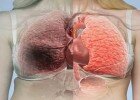All of us know that the human body is mostly composed of water and that we need water so as to survive. The kidneys and the muscles are composed of 73% water, the lungs are 90% water, the blood is 83% water and the brain is 76% water. We lose water every day through urinating, while we breathe and when we sweat.
Most people are advised to drink 6 to 8 glasses of water per day. Generally, men need to drink 12 cups or 3 liters a day, while women 9 cups or 2.2 liters a day. Not drinking the recommended dosage can cause mild dehydration which can manifest itself in a number of symptoms.
10 Signs That You Need to Drink More Water
- The Color Of Your Urine is Dark Yellow
This is usually the first sign that you need to drink more water. Normally, the urine needs to be light yellow-amber. If somebody is not consuming the recommended dosage of water, the concentration of waste in the kidneys is higher, and it includes proteins, toxins and dead blood cells which need to be eliminated from the body.
Moreover, the urine can be darker after taking some medications, beets, B-Vitamins, food coloring, asparagus or blackberries. In case you notice that the color of your urine has changed, take in consideration if you have consumed something that would change it. Then, start drinking more water and see if the color changes. In case the color of the urine is darker for a longer time period, it could indicate more serious health issues like gallstones or hepatitis.
- The Output of the Urine is Decreased
The majority of people urinate from 6 to 7 times in a period of 24 hours. If there is lack of water there are also less fluids that are eliminated from the body. Moreover, the kidneys try to retain as much water as they can in order to prevent dehydration. In case you don’t urinate more than 6 times a day, increase the consumption of water.
- Constipation
Constipation is primarily caused by dehydration, thereby consuming more water can solve this problem. When not completely hydrated, the body makes an attempt to absorb water from anywhere, including the colon. Water is essential for easy-to-pass and soft stools. Normally, when there is not enough water, the stools are harder and pass with difficulty.
In order to treat and prevent constipation, make sure that you drink enough water and also consume more fruits and vegetables. Moreover, constipation can be caused by hypothyroidism, physical inactivity, stress, food sensitivities, dysbiosis and intestinal inflammation.
- You Have Defined Wrinkles and Dry Skin
The majority of women use costly moisturizers to maintain their skin smooth and soft. Moreover, some choose to pay a lot of money for procedures in order to eliminate or reduce the wrinkles and the lines. However, the first thing they need to do is drink more water. Dehydration can make the skin sensitive, itching, inflamed and irritated. Moreover, in more serious cases the skin can scale and flake and become very red with bleeds and cracks. Once the skin loses its moisture, the cells start to shrive as well, thus making the wrinkles more defined and the skin older.
- Weight Gain and Hunger
The human body is extremely smart, yet it cannot differ hunger from thirst. The hypothalamus is the part of the brain which regulates thirst and hunger. It often gets confused and causes hunger when a person is actually thirsty. Consequently, taking a snack instead of glass of water causes weight gain and more calories,
In case you want to lose weight, you need to make sure that you drink enough water. Provided that you feel hungry, drink a glass of water, then, wait for about 15 minutes. If you are still hungry, then you should eat.
- Dry Mouth and Thirst
Feeling thirsty is a sign that you have a mild dehydration. A dry mouth is usually a sign that the mucus membranes in your body are dehydrates. What you need to do is drink water during the entire day.
- Headaches
Once the body lacks water, it absorbs water from all tissues so as to compensate. Consequently, the tissues of the brain lose moisture and reduce. Then, the pain receptors are triggered and this causes a headache. If you don’t consume enough water, the volume of the blood drops, and decreases the amount of oxygen that is moved to the brain. Then, the brain’s blood vessels dilate and cause inflammation and swelling, which intensifies the headache.
- Fatigue
According to a study from 2011, mild dehydration can lead to low energy, tiredness and fatigue. Once the volume of your blood decreases and you are dehydrated, the heart works harder so as to push nutrients and oxygen through the body. So, when you feel tired next time, drink a glass of water. Avoid drinking coffee, soda, tea because they do not substitute water.
- Joint Pain
Water lubricates the joints. If there is lack of water, there is a nutrient deficiency in the joints and that damages the cartilage cells. In case you suffer from chronic dehydration, the cartilage can degenerate beyond repair.
- Weak Immune System
When dehydrated, there is an increase in toxins in the blood. This weakens the immune system. Perfect hydration is critical for the immune system.
You Are Thirsty, You Are Not Sick
The majority of people believe that all fluids are hydrating. However, that is not the case since certain beverages like juice, pop and coffee can dehydrate the body due to their content if sugar and caffeine. Dr. Batmanghelidi says that a number of ailments positively respond to increased intake of water. According to this research, joint pain, asthma, cardiovascular disease, obesity, cholesterol, elevated blood pressure, and diabetes can be cured by drinking more water.
Source: The Health Flash




